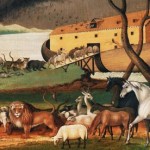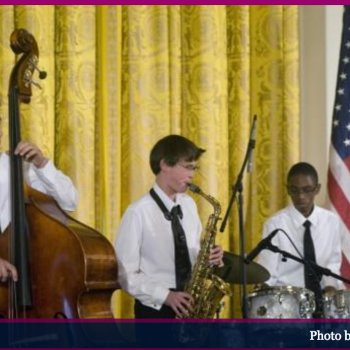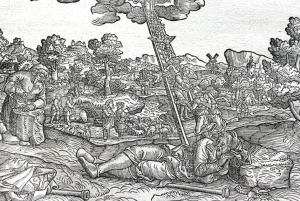 I named this column spiritchatter, and it’s time now to start chattering about the spirit. Let’s start at the very beginning—a lesson in ancient languages. Don’t be intimidated. Get your coffee or tea. Settle down for a few minutes. And plunge in.
I named this column spiritchatter, and it’s time now to start chattering about the spirit. Let’s start at the very beginning—a lesson in ancient languages. Don’t be intimidated. Get your coffee or tea. Settle down for a few minutes. And plunge in.
The Bible was written originally in Hebrew, Aramaic, and Greek. We’ll stick to the Hebrew—the earliest language, and the language of what Jews call Tanak and Christians the Old Testament. The original Hebrew word for “spirit” conveyed a mind-boggling array of concepts, as diverse as a breath, a breeze, a powerful gale, an angel, a demon, the heart and soul of a human being, the waxing and waning of life, a disposition like lust or jealousy, and the divine presence itself. That’s a remarkable range of meanings, and it’s absolutely essential to keep in mind that a single word in Hebrew (ruach—the ch is pronounced gutterally, as if you’re clearing your throat, not as cha cha cha) can convey all of these meanings.
You’ll see this by cracking open a Bible to the first page. Right away, in Genesis 1:1-2, the meaning of ruacḥ is elusive. Pick up a couple translations, and you’ll see this.
In the beginning God created the heavens and the earth. Now the earth was formless and empty, darkness was over the surface of the deep, and the Spirit of God was hovering over the waters. (New International Version)
In the beginning when God created the heavens and the earth … a wind from God swept over the face of the waters. (New Revised Standard Version)
Is ruach wind or Spirit? Or both? The meaning of ruach is so puzzling, in fact, that the New Revised Standard Version includes a note with other possible translations: “while the spirit of God or while a mighty wind.”
What may seem confusing to us is actually a window to a magnificent world. The Hebrew word ruach opens a world of mystery, a vista of possibilities that encompass breath, winds, and divine spirit. It’s like the wardrobe that opens to the world of Narnia—into which you are invited to step. It’s like an old key hole you’d peek through to glimpse a hidden room—into which you’re invited to look. It’s like the passageway Alice falls through to enter Wonderland—into which you are now invited to tumble.
And tumble we will—smack into one of the greatest visions in all of literature … ever—the prophet Ezekiel’s vision of the valley of dry bones, which inspired the song, “Dem bones gonna rise again.”
In English translations of this vision (Ezekiel 37), you’ll find three words—breath, winds, and Spirit. Ezekiel is instructed, “Prophesy to the breath … ‘Come, breath, from the four winds’ …” As a result, “breath entered them,” and the bones “came to life and stood up on their feet—a vast army.” The vision ends with the promise, “I will put my Spirit in you and you will live, and I will settle you in your own land.”
In English translations, you’re led to believe that the breath which is inbreathed into the bones is somehow different from both the four winds that gather and the Spirit that will be put into the nation of Israel. But in the original, it’s all the same word—ruach.
English translations miss out on the drama of the Hebrew. Ezekiel repeats the word, ruach, in order to emphasize that the one and only ruach of God inspires the resurrection of Israel—a resurrection that is at once a personal creation like Adam’s (ruach=breath), a cosmic rush of vitality (ruach=winds), and a promise of national faithfulness (ruach= Spirit). Ezekiel piles up the connotations of ruach to fire the imagination of Israel’s deadened soul. The people are exhausted, nearly exterminated, in exile sometime after 587 BCE, and all they have left are the prophet’s words to break the numbness of their despair.
English translations lose the power of this repetition because the Hebrew ruach is richer and more resonant than the English words, breath, spirit, or wind. English simply can’t shoulder the breadth of meaning or capture the magic of the Bible’s original language.
That’s why one of my favorite lines in Fresh Air: the Holy Spirit for an Inspired Life comes early on in the book—page 5—where I describe the spirit as
“God’s mystical, practical, expansive, unbridled presence in the world, where we least expect it—in every breath we take, in social transformation, in community, in hostile situations, and in serious learning.”
That is the promise of spiritchatter.












